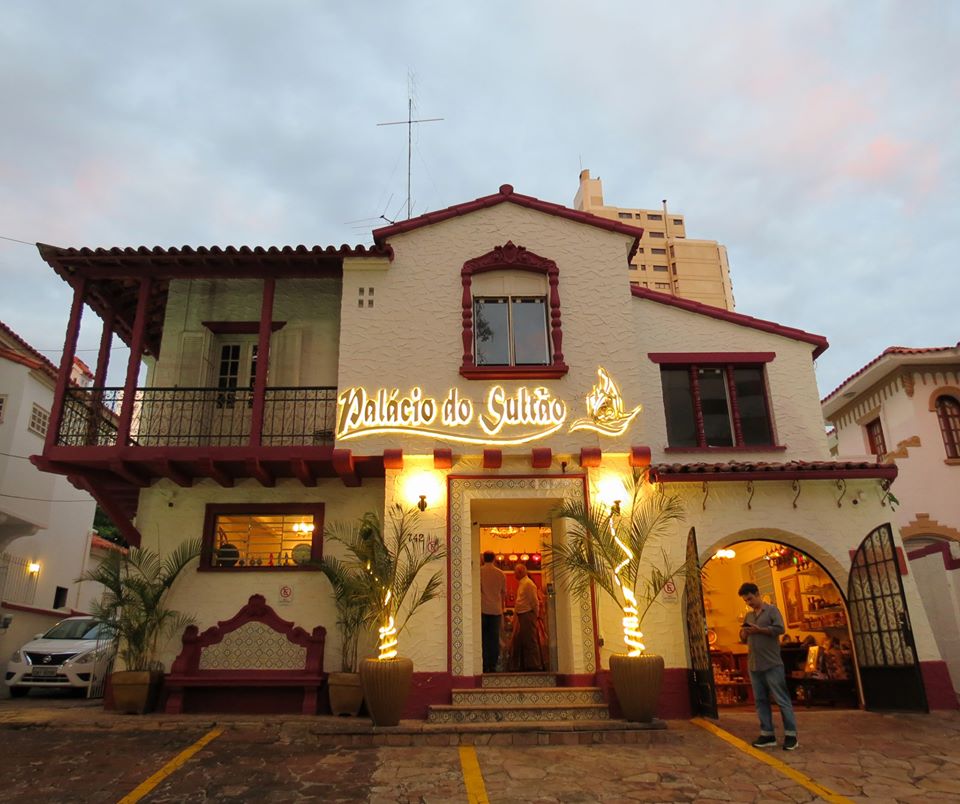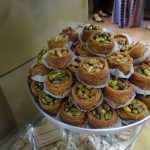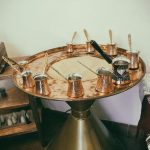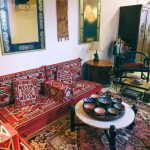São Paulo – If food itself is a one of the strongest ways to keep the connection of immigrants and refugees with their home countries, for the Zinou family this was just one step to bring their roots to the new country. Coming from Aleppo, Syria, in 2014, the couple and their three children fled from the war and found in Campinas, São Paulo, a space to create their first restaurant. To honor their home city, the family created Castelo de Aleppo and learned to serve homemade food in a cozy space.
But the family wanted more than just bringing Arab food to the city that welcomed them. “It was a success, but Castelo is a simple, pay-by-weight restaurant. We have always wanted to do something bigger, so the people could learn about our culture. We are from Aleppo, one of the world’s oldest, culturally richest cities. Unfortunately, the media depicts a lot of bad things about our culture. We wanted a special space where people could learn more. Then came the idea of Palácio do Sultão,” Ayla Zinou, one of the Syrian couple’s daughters, said.
The idea was creating not just a restaurant but a Syrian cultural center. There they serve food, host events, sell decoration items from their culture and keep a tea house too. “We have ten different teas imported from Syria and Turkey. We also have a special coffee that we prepare in a sand machine, which is a very special thing in our region of Syria, Lebanon and Jordan. The Arab world is not just one thing, we have so many differences. So, we found this house, which kind of fits our cultures,” she says.
The building of Palácio
But the house wasn’t exactly ready. Seeing that it was very old, the three young Syrians considering not using it for the venture. “But my father, who’s an engineer, and my mother, who knows about decoration, insisted in renewing this house. They did the impossible! I hope the time comes when they fulfill their dream, being happy rebuilding what they’ve lost,” she explained.
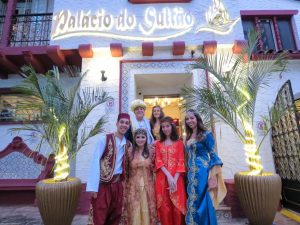
Most decoration items in Palácio do Sultão were imported from Turkey, Syria, Lebanon and other regions in the Middle East. Every detail was thought to make visitor feel they are in Syria. For example, there’s a space to taste the coffee in the traditional Arab coffee, sitting barefoot on the floor surround by rugs. The house also features imported tea machines and even the spices in the meals come from the Middle East.
Food was not the work field of any family member before the war push them out to a new country. Ayla is a dermatologist, her sister an economist, and their brother was a student in Syria and in Brazil was admitted in the Electric Engineering course in the State University of Campinas (Unicamp). Their father is a civil engineering and used to own a lift factory, and their mother is an economist and owned a tourist office.
A whole different life than the one they live now but for the culture they carry with them. “We had never worked with a restaurant before, but my mother cooked very well. In Syria we had the habit to invite friends every week, do a large table, and she always cooked for those home parties,” Ayla said.
In quarantine but still delivering
But still the idea is the house is not limited to food. “We’ve opened last November. Our idea is cooking at least two full Arab dinners a month, with some dance and music performance or even an Arab movie. Cultural events to share our culture. Unfortunately, we didn’t have the time to organize it all.”
During the quarantine, the family has focused in delivery and take-out. “Our work during the quarantine has been hard as we’ve opened recently, so people don’t know us quite well. But we are trying delivery so that we can earn at least the basic so we can work as we’ve planned. We are afraid, specially since I’m a doctor, and I see what’s happening. I hope this ends soon, we’re praying for that and that we can keep fulfilling our dream,” says she, who managed to revalidate her degree in Brazil one year after arriving.
Despite the current difficulties, the Syrians, who had planned to move to the United States, believe they were lucky in changing their route. “We’d like to thank the Brazilian people for their support. Many people helped us when we arrived here. We didn’t thought we would achieve much, but many people were there for us every day. We planned to stay for six months. It’s been six year we’ve been here, and I’m a Brazilian now. Brazil gave me a citizenship. My siblings and parents are waiting for that too. I have friends in several places, and we couldn’t be more at home. Brazil really is a loving country,” Ayla finished.
Palácio do Sultão is taking orders through apps such as Ifood and WhatsApp – (19) 98284-1314 and (19) 98444-5617.
Translated by Guilherme Miranda



